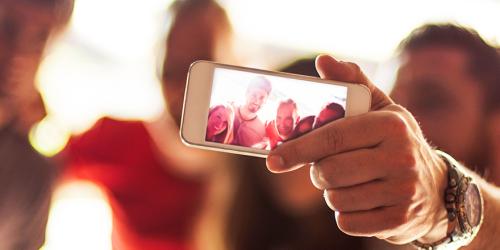Our experienced personal injury lawyers frequently talk to clients about why it’s best to take a break from social media until your lawsuit is resolved, either by way of settlement or adjudication. This may take months or years.
Limiting your social profile should include monitoring social media to make sure your friends and family are not sharing photos, videos or commentary about you that could create misunderstanding and jeopardize your case.
As of January 2021, over 32 million Canadians used social media. That number is equivalent to 84.9% of the population. While social media is a way to stay connected with friends, family and community, it is also a gold mine of information about you.
The major social media sites are Facebook, Instagram, YouTube, LinkedIn, Twitter, Tik Tok and SnapChat. In Alberta, 75% of the populace is on Facebook, 44% on Instagram, 35% on LinkedIn, 26% on Twitter and 10% on Tik Tok.
Following an accident, you should be very careful about what you post on social media. You must also be careful what your friends and family share.
You should assume that the defendants in the lawsuit, their lawyers, private investigators hired by them, as well as their insurance adjusters and claims managers, can and may use social media as an investigative tool. In effect, continuing to post to your social media accounts after an injury provides free surveillance for these opposing parties.
How social media posts can be used against you
Opposing parties in a lawsuit can use your social media activity to negate or minimize the amount they will have to pay you by:
- confronting you with photos, videos or your commentary during questioning to undermine your credibility or your account of how your injuries have affected you;
- submitting your social posts as evidence against you at a trial;
- challenging that the cause of your injuries is as you state;
- using the postings to minimize the injuries you have suffered. A picture is worth a thousand words. For example, photos or video of you engaging in strenuous activities speak volumes if you claim your injuries have kept you bedridden;
- looking for evidence that you suffered the injuries before the accident;
- looking for evidence of pre-existing injuries or diseases that explain your symptoms; and
- trying to prove you are not following your doctor’s orders or prescribed treatment plans.
Most personal injury claims in Alberta do not end up in court. Instead, they are settled during negotiations with the defendant’s insurance company. Remember, your position in settlement negotiations will be only as strong as the defendants believe your case to be if you went to trial. If you undercut the strength of your case with harmful social media posts, you may well torpedo your lawsuit.
Why staying active on social media after an injury is a bad idea
It is human nature to play up how well your life is going on social media. Your world is portrayed through rose-coloured glasses, and you may inadvertently embellish how well things are going and how you feel. Even if you don’t indulge in exaggeration, photos or videos only capture a brief moment in time. They may portray you on a rare, good day without capturing how miserable you may feel or how altered your life may be most of the time due to injuries suffered in an accident. This is how a claim that your life has been severely altered by the accident, that you are depressed, suffer PTSD, or are in chronic pain, among other things, can be misrepresented or undercut by social media.
This is what happened to the car accident victim in Kaiser v. Williams, 2015 BCSC 646, who was in hospital for 28 days following an accident. Because she could not care for herself on her discharge from hospital, she moved into her parents’ house for a further two and a half months for assistance with her recovery. She claimed that she could not do housekeeping chores for two years following the accident, and she had to give up or limit her social and recreational activities, such as dancing, jogging, boating, and wake surfing. The defendants acknowledged that the plaintiff was seriously injured, but they challenged her credibility and questioned the extent of her injuries.
Defence lawyers used the plaintiff’s Facebook entries to contradict her evidence. A large number of photos on Facebook showed the plaintiff dancing, jumping and performing handstands. There was also a video of her wake surfing post-injury. Notwithstanding the plaintiff’s evidence, which was supported by evidence of her friends and family at trial, the trial judge accepted the evidence of the expert for the defence as more accurately reflecting her real limitations from the accident. He based this on “the sheer volume of photographs and activities combined with the complete absence of any suggestion of pain or discomfort or social withdrawal.” As a result, her damages were significantly reduced.
Similarly, in Cikojevic v. Timm, 2008 BCSC 74, the plaintiff, injured in a car accident, sought an advance of damages for rehabilitation and treatment and claimed that she could not afford the treatment otherwise. The judge pointed to some 600 photographs from her Facebook profile showing her participating in golf, snowmobiling, rock-climbing, travel and other social activities, all of which he noted had a cost. He concluded that if she could afford these activities, she must have funds and denied her application for an advance of damages.
A note about social media privacy settings
Some people mistakenly think that no one can access your social media posts if your settings are set to private. At one time, the courts held this was so, as it violated privacy rights. However, more recent case law holds that even posts behind a privacy wall can be accessed by the defence, as the need for access to relevant evidence “in the present technological environment” trumps privacy: Isacov v. Schwartzberg, 2018 ONSC 5933. So, suppose the defence can prove that your social media posts are relevant and material to proving (or disproving) the issues raised in your lawsuit. In that case, they will likely be ordered to be produced regardless of your privacy settings.
The best course of action is to assume that nothing is private on social media. Recognize that while strong privacy settings can help, this may not stop others from gaining access or prevent being required to disclose the content by a court
What about deleted social accounts?
The question is whether the injured plaintiff can or should simply deactivate social media accounts or erase any unfavourable social posts altogether? The case law suggests no. As a first point, the defendants may well have screenshots of the evidence already. Erasing the posts could amount to “spoliation” of evidence, which undercuts credibility and attracts judicial sanctions.
An adverse inference may also be drawn against an injured plaintiff if social accounts are deactivated. This was the case in Terry v. Mullowney, 2009 NLTD 56. In this case, the plaintiff suffered soft tissue injuries in two car accidents. At trial, he painted a picture of himself as becoming socially isolated and no longer able to play pool. His credibility was challenged by the defence, and his testimony was found by the judge to be unreliable and inconsistent. He was confronted by the defence with his Facebook posts, which showed he had continued to enjoy a full and active social life. After he was confronted with the Facebook posts at trial, he deactivated his account. The judge drew an adverse inference against him and concluded that the posts he deleted would have damaged his claim.
Another approach suggested by some is to use a pseudonym on social media. However, there is a danger that you may be “doxed” (when someone, usually with malicious intent, searches for and publishes your identifying information). There are issues if you try to go in and “clean” your profiles. We recommend you do not take any action without consulting your personal injury lawyer to avoid being accused of trying to manipulate evidence.
If you can’t stay off social media
If you can’t bring yourself to stay off social media for the duration of your lawsuit, you should at a minimum:
- Set your social media privacy settings to the maximum level of security. However, remember that internet usage records can be subpoenaed, and courts can order social media content relevant to the issues in your lawsuit to be produced. So, “private” settings are not a guarantee.
- Don’t accept any new connections or friend requests. You can’t be sure who is really behind a social media profile. Don’t get catfished!
- Be wary of any new followers;
- Do not post anything about the accident, including photos of the damage to your car, and do not let your friends or family post photos of the accident either;
- Do not post anything about the lawsuit; in particular, do not post any conversations with or advice you may have received from your lawyer, as this may waive solicitor-client privilege;
- If something negative is written about you as a result of the accident, resist the temptation to respond in the press or in social media;
- Do not inadvertently make an admission of liability in your postings by, for example, stating “I’m sorry” or “I crashed my car”;
- Do not post anything about your injuries, including such seemingly innocuous statements as “I’m OK,” “Don’t worry about me,” “I’m lucky, it could have been worse”;
- Do not post any updates of your diagnosis, injuries or treatment, about your general physical or emotional well-being, or about any advice you have received from doctors or other health professionals;
- Do not post any photos, videos or commentary of vacations or fun nights out if you are claiming you can no longer enjoy your previous social life, for example, if you are suffering from depression, PTSD or chronic pain;
- Be mindful that posting photos or videos of yourself that show you smiling and happy or using emoticons to indicate your mood can be misunderstood and misconstrued. Before you post, think about how you would respond to claims by defence lawyers that the images show you are doing just fine after your injury.
- Tell your friends and family not to post about you or tag you in photos, untag yourself from any photos of you taken after your injury, and do not tag yourself in other people’s postings. Be aware the people can tag you without your knowledge. Set your notifications to alert you when you are mentioned in posts or status updates by other people.
Tell your lawyer EVERYTHING
Although it may be challenging to take a self-imposed break from social media, the best course of action when you are injured in an accident is to stay off social media altogether until your lawsuit is resolved. When you speak to a lawyer about your accident, you should tell them about any social media accounts and let them know what you posted. Let your lawyer advise you about any existing posts you may have made before realizing it was better to stay off social media. Your lawyer needs to know what is out there in the public domain that may present problems that need to be addressed. It’s much better to be prepared to meet an argument than to get caught by surprise.
About CAM LLP experienced personal injury lawyers
At CAM LLP, we understand the impact and ripple effects that a serious injury can have on your life and the lives of those you love.
Since 1962, our lawyers have been achieving precedent-setting results for injured Albertans. Years of experience evaluating claims, negotiating settlements with insurance companies, and helping injured people get fair compensation makes a difference
Please contact us for a free consultation.

